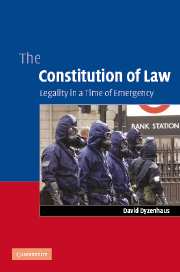3 - Taking the administrative state seriously
Published online by Cambridge University Press: 10 December 2009
Summary
Recognizing rationality
It is still the case today that the most sustained attempt to understand judicial review for jurisdictional error as a legal phenomenon occurred in a series of articles, starting in the 1920s and finishing in the 1970s, by D. M. Gordon, a lawyer who practised in British Columbia. By legal phenomenon, I mean an attempt to understand such review within a coherent account of the rule of law. For it is easy to understand the political and other rationales for delegating authority to officials to implement public programmes – rationales to do with complexity, efficiency, and expertise. It is also easy to understand the reasons why governments think it necessary to protect public officials from the kind of judicial meddling which undermines the delivery of the statutory programmes the officials are charged with administering. In chapter 2, I discussed one of the main vehicles for protection, the privative clause which tells judges to refrain from review.
But as we have seen, there are significant problems from the perspective of the rule of law for understanding the privative clause, which is why the evisceration approach developed in the United Kingdom, the approach which we saw simply empties a privative clause of all meaning. And, as we have also seen, the Australian attempt to take the privative clause seriously, as a legislative expansion of administrative jurisdiction, perches uneasily between evisceration and a rather different approach, the Canadian deferential approach.
- Type
- Chapter
- Information
- The Constitution of LawLegality in a Time of Emergency, pp. 121 - 173Publisher: Cambridge University PressPrint publication year: 2006
- 1
- Cited by



